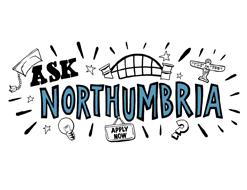-
Study
-
Clearing 2025
- Clearing FAQs
- Clearing VIP
- Clearing Case Studies
- Unlock Your Potential
- Scholarships
- Search Clearing
-
Undergraduate
- UCAS Clearing & Confirmation 2025
- Application Guides
- UCAS Exhibitions
- Foundation Years
- School & College Outreach
- Information for Parents
-
Postgraduate
- Application Guide
- Postgraduate Research Degrees
- Flexible Learning
- Change Direction
- Register your Interest
-
-
International
International
Northumbria’s global footprint touches every continent across the world, through our global partnerships across 17 institutions in 10 countries, to our 277,000 strong alumni community and 150 recruitment partners – we prepare our students for the challenges of tomorrow. Discover more about how to join Northumbria’s global family or our partnerships.
View our Global Footprint-
Quick Links
- Course Search
- Undergraduate Study
- Postgraduate Study
- Information for Parents
- London Campus
- Northumbria Pathway
- Cost of Living
- Sign up for Information
-
International Students
- Information for Students
- International Events
- Application Guide
- Entry Requirements and Education Country Agents
- Global Offices
- English Requirements
- English Language Centre
- International student support
- Cost of Living
-
International Fees and Funding
- International Undergraduate Fees
- International Undergraduate Funding
- International Masters Fees
- International Masters Funding
- International Postgraduate Research Fees
- International Postgraduate Research Funding
-
International Partners
- Agent and Representatives Network
- Global Partnerships
- Global Community
-
International Mobility
- Information for Northumbria Students
- Information for Incoming Exchange Students
-
-
Business
Business
The world is changing faster than ever before. The future is there to be won by organisations who find ways to turn today's possibilities into tomorrows competitive edge. In a connected world, collaboration can be the key to success.
More on our Business Services -
Research
Research
Northumbria is a research-rich, business-focused, professional university with a global reputation for academic quality. We conduct ground-breaking research that is responsive to the science & technology, health & well being, economic and social and arts & cultural needs for the communities
Discover more about our Research-
Quick Links
- Research Peaks of Excellence
- Academic Departments
- Research Staff
- Postgraduate Research Studentships
- Research Events
-
Research at Northumbria
- Interdisciplinary Research Themes
- Research Impact
- REF
- Partners and Collaborators
-
Support for Researchers
- Research and Innovation Services Staff
- Researcher Development and Training
- Research Ethics and Integrity
- University Library
- Vice Chancellors Fellows
-
Research Degrees
- Postgraduate Research Overview
- Doctoral Training Partnerships and Centres
- Academic Departments
-
Research Culture
- Research Culture
- Research Culture Action Plan
- Concordats and Commitments
-
-
About Us
-
About Northumbria
- Our Strategy
- Our Staff
- Place and Partnerships
- Leadership & Governance
- Academic Departments
- University Services
- History of Northumbria
- Contact us
- Online Shop
-
-
Alumni
Alumni
Northumbria University is renowned for the calibre of its business-ready graduates. Our alumni network has over 246,000 graduates based in 178 countries worldwide in a range of sectors, our alumni are making a real impact on the world.
Our Alumni - Work For Us
What will I learn on this module?
On this module you will learn how to develop, edit and contribute to writing projects in the real world, from poetry and short fiction anthologies to special issues of magazines, collections of reviews, and specialist blogs. You will study a range of creative and professional writing projects and produce your own, from initial pitch to writing, publicising, editing and producing the finished item. You will learn to reflect on your own writing identity and the process of writing to a brief, and how to evaluate and write a structured report on a project. You will learn from writing professionals and develop skills which prepare you for your future professional life as well as further study at level 6.
How will I learn on this module?
The module is taught through two weekly 1.5 hour sessions which will be a combination of seminars, writing exercises, writing workshops, and one-to-one tutorials.
In seminars and workshops you will develop ideas and pitch them to peers, and work collaboratively to turn the best pitches into real writing projects, under the guidance of the module tutor, and they will cover key aspects of running, promoting and contributing to professional writing projects. You will learn to write for different projects and in response to particular briefs, and develop creative contributions to your group’s project. The sessions encourage you to think about your own writing identity and to connect your creative work with real projects and audiences, helping you to understand your studies as a preparation for your later professional life. The aim of the module is to begin developing your professional writing portfolio and give you the skills, knowledge and confidence you need in your career. The module makes appropriate use of technology enhanced learning through use of the Blackboard electronic learning platform and the online support offered by Northumbria’s SkillsPlus programme.
In addition to the scheduled seminars, you are expected to undertake both directed and independent learning. Directed learning includes preparation for seminars and workshops (including both reading and written work) individually and in groups. Independent learning includes further reading and investigation, the consolidation of seminar materials, and revision/preparation for the module assignments. The writing projects will be produced through group working and a key aim of the module is for you to learn to work collaboratively, although you will be assessed on your own individual contribution and your own reflection on the process.
How will I be supported academically on this module?
Your learning will be academically supported by peer and tutor feedback on your work within writing workshops. Your tutor will support the development and realisation of group projects, and provide one-to-one tutorial support.
The module handbook provides details of seminars, reading lists and assessment criteria; PowerPoint slides are made available on the e-learning platform, together with links to relevant skills materials in the library.
The module tutor is available in seminars, as well as during office hours, to discuss any queries or concerns you have.
You are advised to see your Guidance Tutor at least twice each semester to review your academic progress. The Guidance Booklet, which you receive at the start of your first year, includes structured materials designed to help you develop your self-reflection skills. These materials underpin the academic side of the regular Guidance meetings, helping you to learn how to best use the feedback you receive on your assignments, how to build on your strengths, and improve in the areas where you could perform better.
What will I be expected to read on this module?
All modules at Northumbria include a range of reading materials that students are expected to engage with. Online reading lists (provided after enrolment) give you access to your reading material for your modules. The Library works in partnership with your module tutors to ensure you have access to the material that you need.
What will I be expected to achieve?
Knowledge & Understanding:
• Demonstrate an understanding of the process of developing and delivering a group writing project
Intellectual / Professional skills & abilities:
• Produce effective creative/professional writing in relation to a brief
• Work with others to edit a writing project
Personal Values Attributes (Global / Cultural awareness, Ethics, Curiosity) (PVA):
• Reflect critically on work of self and others
How will I be assessed?
Formative:
Formative feedback is offered in individual 15 – 20 minute tutorials as well as through feedback in seminars and written feedback on draft materials.
Additionally, students will give formative presentations in groups in week 4, presenting an initial draft of their publication's call for submissions, on which they will receive immediate verbal peer and tutor feedback before sharing the call publicly by the end of week 5.
Summative:
Assessment 1 (30% summative):
A report submitted in week 6, reflecting on the process of developing the call for submissions and outlining the role you will be playing in the group (750 words).
Assessment 2 (70% summative):
A portfolio of work which may include creative pieces addressing specific briefs, reflection on your own practice, and an evaluative report on your group’s project (total 3,250 words)
Feedback will be provided using the Departmental template and comments on the script.
Pre-requisite(s)
N/A
Co-requisite(s)
N/A
Module abstract
This second-year ‘live brief’ module will allow you to learn how to develop, edit and contribute to writing projects in the real world, from poetry and short fiction anthologies, to special issues of magazines, collections of reviews, and specialist blogs.
Drawing on departmental expertise in editing and publishing, it gives you the opportunity to learn from writing professionals and develop skills which prepare you for your future professional life as well as further study at level 6.
Through engagement with tutors, writing exercises and independent reading, you will develop deeper understanding and appreciation of the concept of practice-led research and some of the practices and issues of carrying out creative and professional writing projects.
You will study a range of creative and professional writing projects and produce your own in small groups, from the initial pitch to writing, publicising, editing and producing the finished item. You will also learn to reflect on your own writing identity and the process of writing to a brief, and how to evaluate and write a structured report on a project.
The module will develop key employability and enterprise skills, preparing students for writing projects in the real world.
Course info
UCAS Code QW38
Credits 20
Level of Study Undergraduate
Mode of Study 3 years Full Time or 4 years with a placement (sandwich)/study abroad
Department Humanities
Location City Campus, Northumbria University
City Newcastle
Start September 2025 or September 2026
All information is accurate at the time of sharing.
Full time Courses are primarily delivered via on-campus face to face learning but could include elements of online learning. Most courses run as planned and as promoted on our website and via our marketing materials, but if there are any substantial changes (as determined by the Competition and Markets Authority) to a course or there is the potential that course may be withdrawn, we will notify all affected applicants as soon as possible with advice and guidance regarding their options. It is also important to be aware that optional modules listed on course pages may be subject to change depending on uptake numbers each year.
Contact time is subject to increase or decrease in line with possible restrictions imposed by the government or the University in the interest of maintaining the health and safety and wellbeing of students, staff, and visitors if this is deemed necessary in future.
Useful Links
Find out about our distinctive approach at
www.northumbria.ac.uk/exp
Admissions Terms and Conditions
northumbria.ac.uk/terms
Fees and Funding
northumbria.ac.uk/fees
Admissions Policy
northumbria.ac.uk/adpolicy
Admissions Complaints Policy
northumbria.ac.uk/complaints















